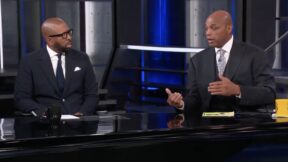CNN Legal Analyst Stunned By ‘Remarkably Forceful’ Trump Immunity Ruling: ‘Not A Good Word For Trump In It’
CNN legal analyst Elie Honig was stunned by the “remarkably forceful” appeals court decision denying former President Donald Trump’s claim of “TOTAL IMMUNITY,” noting there wasn’t “a good word for Trump in it.”
It has been four weeks since the stunning appeals court hearing at which Trump’s attorney argued that a president could order Seal Team Six to assassinate a political rival and not face prosecution unless he were impeached and convicted first.
On Tuesday, the appeals court finally made its ruling.
In a 57-page opinion, the three-judge panel unanimously decided no, presidents can’t legally order assassinations. The appeal was decided by a three-judge panel consisting of Judge J. Michelle Childs, who was nominated by President Joe Biden in January 2022 and confirmed in July 2022; Judge Florence Pan, nominated by Biden in May 2022 and confirmed in September 2022; and Judge Karen LeCraft Henderson, who was appointed by then-President George H.W. Bush in 1990.
On Tuesday’s edition of CNN News Central, Honig was astonished by the force of the opinion, and the tenor of the ruling:
SARA SIDNER: Three main arguments that Donald Trump’s team has put forward, and they have just been one after the other, eviscerated by this court. Can you give us what those arguments are and what the response of this court is?
ELIE HONIG: This is a remarkably forceful ruling! I don’t know if there’s a good word in here for Donald Trump in 57 pages.
So the court takes down Donald Trump’s argument in three parts. First of all, they say there is no absolute immunity for the president. It is not, and cannot be, that a president or former president can never be charged for anything he did from January 20th at noon when he took office, to four years later when he left office, that would leave us in a state of lawlessness.
So they reject absolute immunity.
Number two, they reject Donald Trump’s argument that, well, even if there’s limited immunity, I was within the boundaries. They say, oh, no, you are not. Not only do they say you were outside the boundaries, they say essentially, they say in this ruling, what you did was criminal.
SARA SIDNER: Inside the boundaries of the job of president.
ELIE HONIG: Exactly the boundaries of the job. And President Trump’s argument is, well, I was doing things I was calling other public officials. I was coordinating election oversight. That’s part of the president’s job. What, what Jack Smith and this Court of Appeals panel say is, oh, no, what you were doing was well over that line, well out of bounds and indeed potentially arguably criminal.
The third argument that they reject is Donald Trump’s sort of, let’s say, inventive argument that a former president or president can only be indicted once he’s been impeached by the House of Representatives and then convicted by the US Senate. Only then can he be criminally indicted.
That was a creative construction that doesn’t work for a lot of obvious reasons. I mean, this is why if you think back to the oral argument, when you had these bizarre scenarios, what if a president ordered the assassination of his rival, right?
And the answer from Trump’s team was a very unconvincing only if he’s been impeached first. So this court has rejected that.
And I just want to read the sentence that jumps out to me that I think really captures the tenor of this opinion here. Here’s what the court writes. The Court of Appeals, quote, “At bottom, former President Trump’s stance would collapse our system of separated powers by placing the president beyond the reach of all three branches.”.
I mean, collapse. Our system of separation of powers is very strong language.
JOHN BERMAN: That is powerful language.
Watch above via CNN News Central.




